祈使句的反义疑问句
句型转换反义疑问句

句型转换反义疑问句反义疑问句是英语中的一种特殊语气形式,用于提出含有情感色彩的问题,常用于肯定句、祈使句后面。
它可以通过改变原句中的疑问形式,来表达一种相反的意思。
本文将探讨句型转换反义疑问句的相关知识,以及一些实用的技巧和例句。
一、句型转换规则在转换反义疑问句时,需要改变原句的疑问部分。
一般情况下,如果原句是肯定句,反义疑问句中的疑问部分采用否定形式;如果原句是否定句,反义疑问句中的疑问部分则改为肯定形式。
同时,也需要根据主谓的人称和数目做出相应的调整。
以下是一些常见的句型转换规则:1. 当原句为肯定陈述句时,反义疑问句的疑问部分使用否定形式,并保持与原句主谓的一致。
例如:- You are a teacher, aren't you?- He can swim, can't he?2. 当原句为否定陈述句时,反义疑问句的疑问部分使用肯定形式,并保持与原句主谓的一致。
例如:- She doesn't like coffee, does she?- They won't come, will they?3. 当原句为祈使句时,反义疑问句的疑问部分使用肯定形式,并保持与原句主谓的一致。
例如:- Don't go, will you?- Keep quiet, won't you?二、句型转换技巧除了常见的句型转换规则外,还有一些技巧可以帮助我们更好地转换反义疑问句。
1. 肯定形式的反义疑问句当原句为肯定形式时,我们可以使用以下句式来转换成反义疑问句:- It looks/ seems/ appears + 肯定/否定形式,doesn't it?- You know/ understand/ remember/ realize + 肯定/否定形式, don't you?例如:- You are coming to the party, aren't you?- He knows the answer, doesn't he?2. 否定形式的反义疑问句当原句为否定形式时,我们可以使用以下句式来转换成反义疑问句:- It looks/ seems/ appears + 否定/肯定形式,does it?- You don't know/ understand/ remember/ realize + 否定/肯定形式, do you?例如:- She doesn't like chocolate, does she?- They don't live here, do they?三、例句展示下面是一些常见句型的例句展示,以便更好地理解句型转换反义疑问句的用法:1. 肯定形式的反义疑问句:- You are a student, aren't you?(你是学生,不是吗?)- She can play the piano, can't she?(她会弹钢琴,对吧?)2. 否定形式的反义疑问句:- He doesn't have any money, does he?(他没有钱,对吗?)- They don't like spicy food, do they?(他们不喜欢辣食,对吧?)3. 祈使句的反义疑问句:- Don't be late, will you?(不要迟到,好吗?)- Keep the door closed, won't you?(请关好门,好吗?)四、总结通过句型转换可以更灵活地运用反义疑问句,丰富英语表达。
18种特殊反义疑问句

初中英语18种特殊的反意疑问句1.祈使句。
祈使句后一般加上will you或won't you构成反意疑问句,用will you 多表示“请求”,用won't you 多表示提醒对方注意。
例如:Look at the blackboard, will you/ won't you?看黑板,好吗?Let引导的祈使句有两种情况:1)Let's...,后的反意疑问句用shall we或shan't we。
例如:Let's go home, shall we/ shan't we? 回家吧,好吗?还可以用may I来表示征求对方的同意或许可。
2)Let us/me...后的反意疑问句用will you或won't you。
例如:Let me have a try, will you/won't you? 让我试一试,行吗?2.感叹句。
感叹句后加反意疑问句时,其反意疑问句需用be的一般现在时态的否定形式。
例如:What fine weather, isn't it? 多好的天气啊,是吧?3. 当陈述部分谓语动词是need, dare, used to,且这些词被用作实义动词时,其反意疑问句需用do的适当形式。
例如:He needs help, doesn't he?他需要帮助,是吗?4.陈述部分主、谓语是I am...时,反意疑问句用aren't I 或ain't I ,而不是am not I (可用am I not)。
例如:I'm working now, ain't I? 我在工作,是吗?5.陈述部分的主语是everything, nothing, anything或something 时,反意疑问句的主语应用代词it。
例如:Something is wrong with my radio, isn't it? 我的收音机出毛病了,是吧?6.陈述部分的主语是everybody, everyone, anybody, anyone, somebody, someone, nobody, no one, none, neither 时, 其反意疑问句的主语需用复数代词they。
初二上教案7祈使句及其反义疑问句
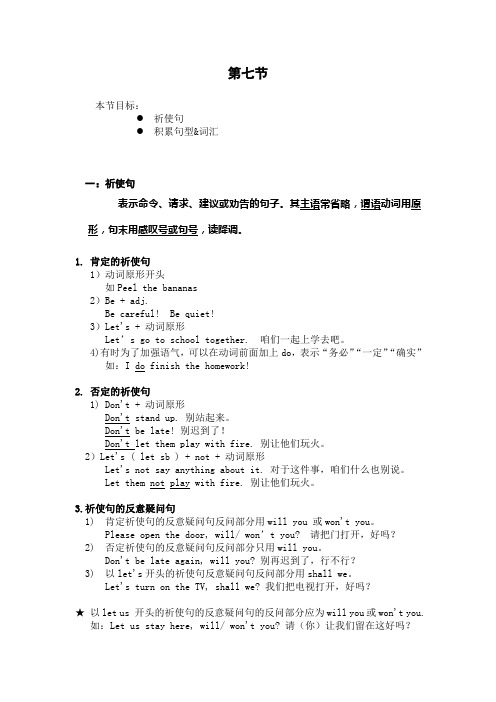
第七节本节目标:●祈使句●积累句型&词汇一:祈使句表示命令、请求、建议或劝告的句子。
其主语常省略,谓语动词用原形,句末用感叹号或句号,读降调。
1. 肯定的祈使句1)动词原形开头如Peel the bananas2)Be + adj.Be careful! Be quiet!3)Let's + 动词原形Let’s go to school together. 咱们一起上学去吧。
4)有时为了加强语气,可以在动词前面加上do,表示“务必”“一定”“确实”如:I do finish the homework!2. 否定的祈使句1) Don't + 动词原形Don't stand up. 别站起来。
Don't be late! 别迟到了!Don't let them play with fire. 别让他们玩火。
2)Let's ( let sb ) + not + 动词原形Let's not say anything about it. 对于这件事,咱们什么也别说。
Let them not play with fire. 别让他们玩火。
3.祈使句的反意疑问句1) 肯定祈使句的反意疑问句反问部分用will you 或won't you。
Please open the door, will/ won’t you? 请把门打开,好吗?2) 否定祈使句的反意疑问句反问部分只用will you。
Don't be late again, will you? 别再迟到了,行不行?3) 以let's开头的祈使句反意疑问句反问部分用shall we。
Let's turn on the TV, shall we? 我们把电视打开,好吗?★以let us 开头的祈使句的反意疑问句的反问部分应为will you或won't you.如:Let us stay here, will/ won't you? 请(你)让我们留在这好吗?即学即练:1._______ cross the road until the traffic lights turn green.A. NotB. Won'tC. Doesn'tD. Don't2. Please help me carry it, ______?A. will IB. will youC. shall ID. shall we3. Don’t make so much noise, ______?A. will youB. won't youC. shall weD. do you4. Kate, _______ your homework here tomorrow.A. bringB. bringsC. to bringD. bringing5.________ me the truth, or I'll be angry.A. TellingB. To tellC. ToldD. Tell6. ----Don’t forget to give my best wishes to your uncle.----A.No, I don’tB.No, I won’tC.Yes, I doD.Yes, I would7. Will you please read it again more slowly? (改为祈使句)___ __ again more slowly, please.8. Let’s watch the sports games. (改为反意疑问句)Let's watch the sports games, _____ _____?9. Please sit next to Nancy. (改为否定句)_____ _____ next to Nancy.10. Don’t forget to turn off the lights, please. (改为反意疑问句)Don’t forget to turn off the lights, _____ _____?11.____________ (not, speak) with your mouth full of food and ____________ (be)polite.12.___________ (look) out! A car is coming.二:看图填空1__________ all the things we eat and drink, water is the most important. Not many people realize this, but it is quite true. The human body can live 2___________ food for a long time, but two or three days without water usually leads to(导致)death. Many people do not understand how 3__________ water the human body needs at work and many people do not drink 4__________ ,especially in cold weather. Most people drink enough only in 5___________ weather. Most people drink when they are 6___________, but we often need more water, especially 7___________ doing exercise.A man’s body contains 65%-75% water. Water is very important in several different 8___________. Most people need about five to seven liters(升)of water every day, but we do not need to drink that amount(量), 9____________ a lot of water comes from the food we eat. If we do not have enough water, however, we 10____________ tired and may become ill.三:完形填空All over the world people enjoy sports. Sports help people to keep __36___, happy and to live _ 37___. People play different games in winter and summer.__ 38___ is good for swimming. And in winter people often go skating. Some sports are very __ 39___ and people everywhere like them. For example, football is very popular. In China, most people, men, ___40___ boys and girls, like to watch football games.They often talk about them. __41___ and jumping began long, long ago. But basketball and volleyball are rather __42_____. People began to play them not long ago. And people are___ 43____ new sports or games all the time. Water skiing is one of ___44_____. People ___45____ different countries may not be able to understand each other, but after a game they often become friends.( )36.A. health B. busy C. healthy D. lazy ( )37.A. long B. longer C. happy D. happily ( )38.A. Winter B. Summer C. Autumn D. Spring ( )39.A. boring B. difficult C. expensive D. interesting ( )40.A. woman B. women C. old D. young( )41.A. Run B. Runs C. Running D. To run ( )42.A. new B. interesting C. popular D. old( )43.A. start B. play C. playing D. starting ( )44.A. oldest B. newest C. The oldest D. the newest ( )45.A. in B. of C. from D.at四:小小翻译家1.我们学校里仅有六个女教师。
祈使句的反义疑问句练习答案
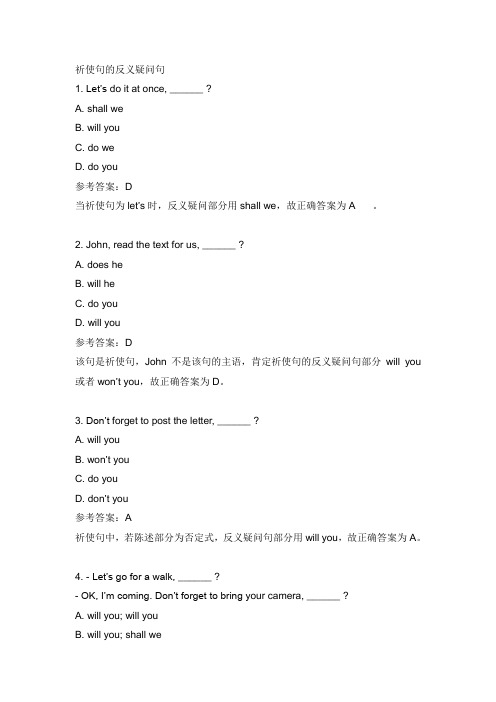
祈使句的反义疑问句1. Let’s do it at once, ______ ?A. shall weB. will youC. do weD. do you参考答案:D当祈使句为let’s时,反义疑问部分用shall we,故正确答案为A 。
2. John, read the text for us, ______ ?A. does heB. will heC. do youD. will you参考答案:D该句是祈使句,John不是该句的主语,肯定祈使句的反义疑问句部分will you 或者won’t you,故正确答案为D。
3. Don’t forget to post the letter, ______ ?A. will youB. won’t youC. do youD. don’t you参考答案:A祈使句中,若陈述部分为否定式,反义疑问句部分用will you,故正确答案为A。
4. - Let’s go for a walk, ______ ?- OK, I’m coming. Don’t forget to bring y our camera, ______ ?A. will you; will youB. will you; shall weC. shall we; shall weD. shall we; will you参考答案:Dlet’s的反义疑问部分用shall we,否定祈使句的反义疑问句部分用will you,故正确答案为D。
5. You girls stand in the front row, ______ ?A. do theyB. will theyC. do youD. will you参考答案:D有时祈使句带有自己的主语,此时不要将其误认为是陈述句,由于该句是祈使句的肯定含义,故正确答案为D。
6. 按要求改写句子。
Don’t tell him the secret.(改为反义疑问句)Don’t tell him the secret, ______ ______ ?参考答案:will you否定祈使句的反义疑问句部分用will you,故该题正确答案为will you。
6:次课祈使句反义疑问句 (1)
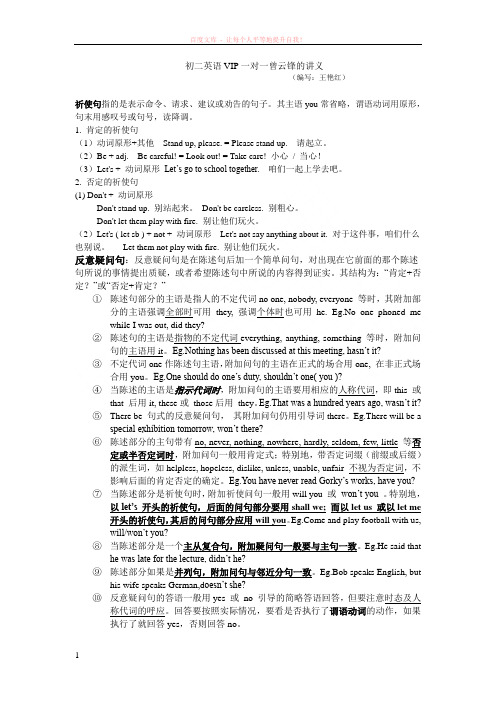
初二英语VIP一对一曾云锋的讲义(编写:王艳红)祈使句指的是表示命令、请求、建议或劝告的句子。
其主语you常省略,谓语动词用原形,句末用感叹号或句号,读降调。
1. 肯定的祈使句(1)动词原形+其他Stand up, please. = Please stand up. 请起立。
(2)Be + adj. Be careful! = Look out! = Take care! 小心/ 当心!(3)Let's + 动词原形Let’s go to school together. 咱们一起上学去吧。
2. 否定的祈使句(1) Don't + 动词原形Don't stand up. 别站起来。
Don't be careless. 别粗心。
Don't let them play with fire. 别让他们玩火。
(2)Let's ( let sb ) + not + 动词原形Let's not say anything about it. 对于这件事,咱们什么也别说。
Let them not play with fire. 别让他们玩火。
反意疑问句:反意疑问句是在陈述句后加一个简单问句,对出现在它前面的那个陈述句所说的事情提出质疑,或者希望陈述句中所说的内容得到证实。
其结构为:“肯定+否定?”或“否定+肯定?”①陈述句部分的主语是指人的不定代词no one, nobody, everyone 等时,其附加部分的主语强调全部时可用they, 强调个体时也可用he. Eg.No one phoned mewhile I was out, did they?②陈述句的主语是指物的不定代词everything, anything, something 等时,附加问句的主语用it。
Eg.Nothing has been discussed at this meeting, hasn’t it?③不定代词one作陈述句主语,附加问句的主语在正式的场合用one, 在非正式场合用you。
祈使句及反义疑问句
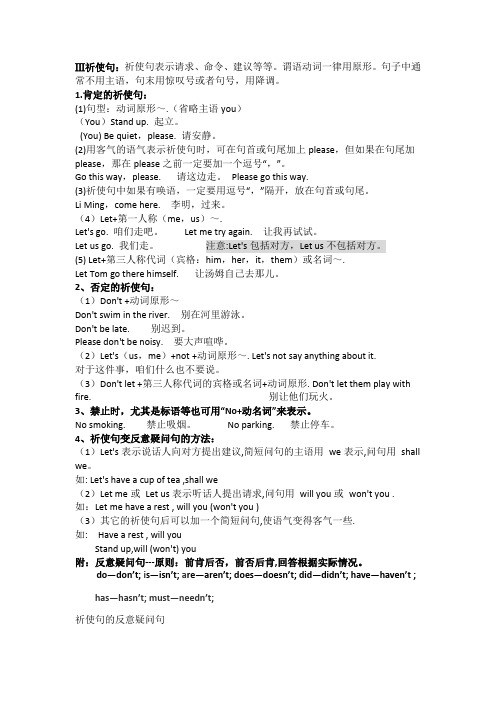
Ⅲ祈使句:祈使句表示请求、命令、建议等等。
谓语动词一律用原形。
句子中通常不用主语,句末用惊叹号或者句号,用降调。
1.肯定的祈使句:(1)句型:动词原形~.(省略主语you)(You)Stand up. 起立。
(You) Be quiet,please. 请安静。
(2)用客气的语气表示祈使句时,可在句首或句尾加上please,但如果在句尾加please,那在please之前一定要加一个逗号“,”。
Go this way,please. 请这边走。
Please go this way.(3)祈使句中如果有唤语,一定要用逗号“,”隔开,放在句首或句尾。
Li Ming,come here. 李明,过来。
(4)Let+第一人称(me,us)~.Let's go. 咱们走吧。
Let me try again. 让我再试试。
Let us go. 我们走。
注意:Let's包括对方,Let us不包括对方。
(5) Let+第三人称代词(宾格:him,her,it,them)或名词~.Let Tom go there himself. 让汤姆自己去那儿。
2、否定的祈使句:(1)Don't +动词原形~Don't swim in the river. 别在河里游泳。
Don't be late. 别迟到。
Please don't be noisy. 要大声喧哗。
(2)Let's(us,me)+not +动词原形~. Let's not say anything about it.对于这件事,咱们什么也不要说。
(3)Don't let +第三人称代词的宾格或名词+动词原形. Don't let them play with fire. 别让他们玩火。
3、禁止时,尤其是标语等也可用“No+动名词”来表示。
No smoking. 禁止吸烟。
No parking. 禁止停车。
祈使句的反义疑问句练习答案

祈使句的反义疑问句1. Let’s do it at once, ______ ?A. shall weB. will youC. do weD. do you参考答案:D当祈使句为let’s时,反义疑问部分用shall we,故正确答案为A 。
2. John, read the text for us, ______ ?A. does heB. will heC. do youD. will you参考答案:D该句是祈使句,John不是该句的主语,肯定祈使句的反义疑问句部分will you 或者won’t you,故正确答案为D。
3. Don’t forget to post the letter, ______ ?A. will youB. won’t youC. do youD. don’t you参考答案:A祈使句中,若陈述部分为否定式,反义疑问句部分用will you,故正确答案为A。
4. - Let’s go for a walk, ______ ?- OK, I’m coming. Don’t forget to bring y our camera, ______ ?A. will you; will youB. will you; shall weC. shall we; shall weD. shall we; will you参考答案:Dlet’s的反义疑问部分用shall we,否定祈使句的反义疑问句部分用will you,故正确答案为D。
5. You girls stand in the front row, ______ ?A. do theyB. will theyC. do youD. will you参考答案:D有时祈使句带有自己的主语,此时不要将其误认为是陈述句,由于该句是祈使句的肯定含义,故正确答案为D。
6. 按要求改写句子。
Don’t tell him the secret.(改为反义疑问句)Don’t tell him the secret, ______ ______ ?参考答案:will you否定祈使句的反义疑问句部分用will you,故该题正确答案为will you。
祈使句及反义疑问句
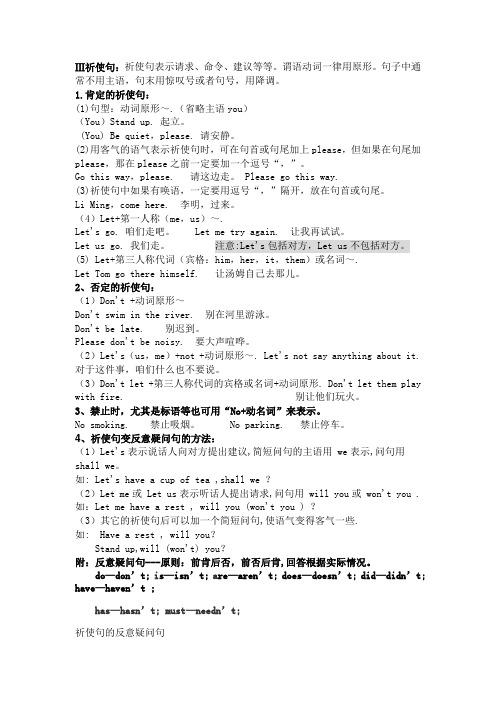
Ⅲ祈使句:祈使句表示请求、命令、建议等等。
谓语动词一律用原形。
句子中通常不用主语,句末用惊叹号或者句号,用降调。
1.肯定的祈使句:(1)句型:动词原形~.(省略主语you)(You)Stand up. 起立。
(You) Be quiet,please. 请安静。
(2)用客气的语气表示祈使句时,可在句首或句尾加上please,但如果在句尾加please,那在please之前一定要加一个逗号“,”。
Go this way,please. 请这边走。
Please go this way.(3)祈使句中如果有唤语,一定要用逗号“,”隔开,放在句首或句尾。
Li Ming,come here. 李明,过来。
(4)Let+第一人称(me,us)~.Let's go. 咱们走吧。
Let me try again. 让我再试试。
Let us go. 我们走。
注意:Let's包括对方,Let us不包括对方。
(5) Let+第三人称代词(宾格:him,her,it,them)或名词~.Let Tom go there himself. 让汤姆自己去那儿。
2、否定的祈使句:(1)Don't +动词原形~Don't swim in the river. 别在河里游泳。
Don't be late. 别迟到。
Please don't be noisy. 要大声喧哗。
(2)Let's(us,me)+not +动词原形~. Let's not say anything about it. 对于这件事,咱们什么也不要说。
(3)Don't let +第三人称代词的宾格或名词+动词原形. Don't let them play with fire. 别让他们玩火。
3、禁止时,尤其是标语等也可用“No+动名词”来表示。
No smoking. 禁止吸烟。
- 1、下载文档前请自行甄别文档内容的完整性,平台不提供额外的编辑、内容补充、找答案等附加服务。
- 2、"仅部分预览"的文档,不可在线预览部分如存在完整性等问题,可反馈申请退款(可完整预览的文档不适用该条件!)。
- 3、如文档侵犯您的权益,请联系客服反馈,我们会尽快为您处理(人工客服工作时间:9:00-18:30)。
1. 基本原则
若陈述部分为祈使句,反意疑问句通常用will you, won’t you, would you等:
Mail the letter today, will you 今天就把信发掉,好吗
Try to be back by two, won’t you 设法两点之前回来,好吗
If you want help, let me know, would you 如果你需要帮助,告诉我,好吗
【注】若陈述部分为否定式,则反意疑问句部分只用will you:
`
Don’t forget to post the letter, will you 请别忘了寄信。
有时根据语境的需要,反意疑问句也可以用can you, can’t you 等:
Give me some cigarettes, can you 给我些香烟,可以吗
Walk faster, can’t you 走快点,不行吗
一般说来,用will you, won’t you, would you 等构成的反意疑问句语气较委婉。
比较:
(
Be quiet, will you 请安静,好吗
Be quiet, can’t you 你不能安静点吗
2. 当祈使句为Let’s…时
反意疑问句总是用 shall we:
Let’s phone her now, shall we 我们现在就给她打电话,好吗
:
Let’s go to the cinema tonight, shall we 今晚咱们去看电影,好吗
From: 当祈使句为Let us…时
若表示请求,反意疑问句用will you,若表示建议,反意疑问句用 shall we:
Let us know your address, will you 请把你的地址告诉我们,好吗
Let us go swimming together, shall we 我们一起去游泳好吗
\
【注】let’s…只表示建议,所以其后反意疑问句总是用shall we。
而let us…既可表示建议请求,也可表示建议(较正式),其后的反意疑问句要根据这两种不同情况分别使用will you和shall we。
4. 当祈使句带有主语时
有时祈使句带有自己的主语,此时不要将其误认为是陈述句:
Jim, you go there to help him, will you 吉姆,你去那儿帮他,好吗
You girls stand in the front row, will you 你们女孩子站在前排,好吗
【注】不要将这类祈使句误认为是陈述句,而误用don’t you这样的反意疑问句。
From:。
